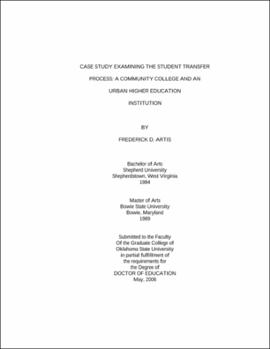| dc.contributor.advisor | Johnson, Deke | |
| dc.contributor.author | Artis, Frederick D. | |
| dc.date.accessioned | 2013-11-26T08:34:08Z | |
| dc.date.available | 2013-11-26T08:34:08Z | |
| dc.date.issued | 2006-05 | |
| dc.identifier.uri | https://hdl.handle.net/11244/7296 | |
| dc.description.abstract | Scope and Method of Study: This case study examined the student transfer process between a community college, Tulsa Community College (TCC) and an urban higher education institution, Oklahoma State University - Tulsa (OSU-Tulsa), in conjunction with the state articulation agreement in order to determine its effect on potential or actual transfer students. The primary questions of interest were; 1) How has the current TCC/OSU-Tulsa student transfer policy affected the TCC Associate of Science majors? 2) From an institutional perspective, what can be done at TCC and/or OSU-Tulsa to improve the student transfer process? The methodology utilized quantitative and qualitative data collection that involved the assemblage of student data and in-depth interviews respectively. Quantitative collection consisted of statistical data, institutional and state transfer policies acquired from TCC, OSU-Tulsa, Oklahoma State Regents for Higher Education (OSRHE) databases and national publications. Qualitative interviews involved 15 participants. Interviews were seven advisors/coordinator and eight associate of science transfer students | |
| dc.description.abstract | Findings and Conclusions: This study argues that the student transfer process is not congruent with the expectations of the state student transfer policy. Self-interest theory was then applied to the thesis in order to provide a framework to explain: (1) Does the theory help to reveal something about the problem?; and (2) Does the theory help in developing strategies for solutions? Among key findings students noted instances that cost them time, money and credit hours; Advisors/Coordinator noted systemic problems; and although concerns were mainly institutional matters, the state Articulation of Transfer Students Agreement also adversely that affected the student transfer process. Quantitative findings revealed a lack of uniform information between the state and the institutions it oversees. Qualitative findings revealed several themes: missed opportunities for students due to inadequate leadership; miscommunication; and lack of consistency. These themes were analyzed utilizing self-interest theory, and recommendations for reform and further research were presented. | |
| dc.format | application/pdf | |
| dc.language | en_US | |
| dc.rights | Copyright is held by the author who has granted the Oklahoma State University Library the non-exclusive right to share this material in its institutional repository. Contact Digital Library Services at lib-dls@okstate.edu or 405-744-9161 for the permission policy on the use, reproduction or distribution of this material. | |
| dc.title | Case study examining the student transfer process: A community college and an urban higher education institution | |
| dc.contributor.committeeMember | Hyle, Adrienne E. | |
| dc.contributor.committeeMember | Mitchell, Earl D. | |
| dc.contributor.committeeMember | Nolan, Robert E. | |
| osu.filename | Artis_okstate_0664D_1850 | |
| osu.accesstype | Open Access | |
| dc.type.genre | Dissertation | |
| dc.type.material | Text | |
| thesis.degree.discipline | Teaching and Curriculum Leadership | |
| thesis.degree.grantor | Oklahoma State University | |
